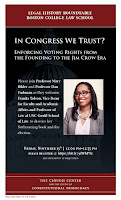- Martha S. Jones published an op-ed in WaPo and was prominently quoted in an NYT story this week about the discovery that Johns Hopkins owned enslaved persons. They are the fruit of the project she directs, Hard Histories at Hopkins.
- The African American History Collection of the William L. Clements Library at the University of Michigan relating to slavery, abolition movements, and various aspects of African American life, largely dating between 1781 and 1865, is now online.
We are grateful to John Q. Barrett for bringing to our attention this quite arresting interview of William O. Douglas from 1966, which we understand he found here.
William O. Douglas (LC)
- The Evolution of Judicial Retirement, by Jake Kobrick, another in a series of posts by the Federal Judicial Center, went up this week.
- The Harvard Law School Library’s Nuremberg Trials Project supplies documents for “The World’s Biggest Murder Trial: Nuremberg" (Harvard Law Today).
- LHB October guest blogger Stefan B. Kirmse will have a virtual book event on The Lawful Empire: Legal Change and Cultural Diversity in Late Tsarist Russia on Monday, Dec.15 at 6-7.30pm Central European Standard Time. You can register here.
- The latest from Lawbook Exchange: Scholarly Law and Legal History.
- LHB congratulates Risa Goluboff on her reappointment as dean of UVA Law.
- Local Legal History from Washington County, PA and Madison County, TX.
Weekend Roundup is a weekly feature compiled by all the Legal History bloggers.










